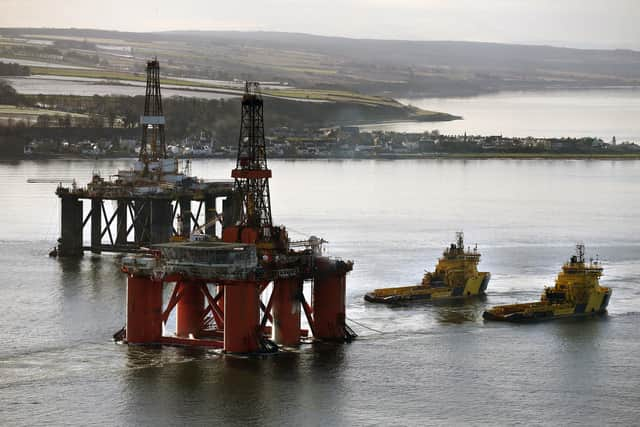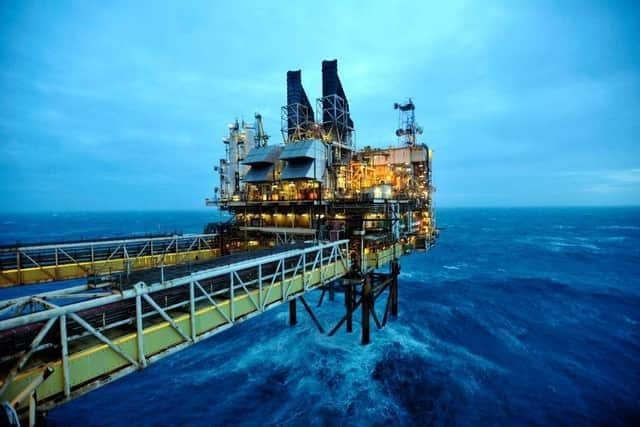GERS figures: Record North Sea revenues drive fall in Scotland's public spending deficit
Scotland’s public spending deficit has fallen to £19.1 billion, largely driven by record North Sea oil and gas revenues.
It came as Scottish ministers accepted the industry will play a role for “some time to come” as they continued to soften their rhetoric on new drilling.
Advertisement
Hide AdAdvertisement
Hide AdStatistics show there was an estimated deficit of 9 per cent of GDP in 2022-23 – substantially higher than the 5.2 per cent for the UK.


David Phillips, an associate director at the Institute for Fiscal Studies, said that without another substantial increase in oil and gas revenues or faster growth in its onshore economy, Scotland’s deficit, measured relative to the size of its economy, will remain substantially higher than that of the UK as a whole.
The latest annual Government Expenditure and Revenue Scotland (GERS) report said Scotland’s deficit would stand at £28.5 billion if North Sea revenue was excluded.
GERS sets out revenues raised in Scotland alongside public spending north of the border, and is prepared independently of Scottish ministers. Its figures have long been a focus of debate when it comes to the finances of an independent Scotland.
Scottish Conservative leader Douglas Ross said GERS showed remaining in the UK is worth more than £1,500 each year for every person in Scotland.


Neil Gray, Scotland’s Wellbeing Economy Secretary, said the report reflects the current constitutional position, and an independent Scotland “would have the powers to make different choices, with different budgetary results”.
He said Scottish ministers oppose “unlimited extraction of oil and gas”, but added: “We know that oil and gas is going to be with us for some time to come.”
He said: “I think the UK Government must be incredibly grateful for the fact that Scotland’s energy sector continues to contribute so heavily towards the UK public finances.”
Advertisement
Hide AdAdvertisement
Hide AdFormer first minister Nicola Sturgeon previously opposed new oil and gas fields, and spoke out against the proposed Cambo oil field off Shetland.


But asked about plans to drill at Rosebank – the UK's largest undeveloped oil field – Mr Gray refused to set out a firm position. “I don’t actually think a decision has been taken by the UK Government on Rosebank, and it’s for them to decide upon it,” he told journalists.
"Again, whether we like it or not, oil and gas licensing continues to be reserved to the UK Government. It’s their decision. We have said very clearly that we want to see more stringent climate compatibility checkpoints to ensure that any oil and gas operations can be consistent with our net zero obligations. But I stress again, oil and gas is going to be with us for some time to come.
"What I want to see is a faster acceleration to that just transition, so that we can reap the opportunity that’s coming both from an economic perspective, but also from a net zero perspective, from our green revolution.”
The rise in North Sea revenue follows the introduction of the windfall tax, as well as the impact of higher oil and gas prices. Scotland’s "geographical share" of North Sea revenue for 2022-23 was £9.4 billion, up from £2.4 billion the previous year.
Public spending north of the border amounted to £106.6 billion in 2022-23, up by £9.3 billion (9.5 per cent) on the previous year. The amount raised in taxes also rose to an estimated £87.5 billion.
Total revenue for Scotland increased by £15 billion (20.7 per cent), which compares to growth of 11.3 per cent for the UK as a whole. As well as the rise in North Sea revenues, Scottish Government income from other sources increased by £8.1 billion (11.5 per cent) – including a £1.9 billion rise from Scottish income tax.
Scotland’s deficit stood at £23.7 billion the previous year – 12.3 per cent of GDP. It was £15.1 billion, or 8.6 per cent of GDP, before Covid.
Advertisement
Hide AdAdvertisement
Hide AdMr Gray claimed a “full £1 billion” of the deficit in Scotland was “the direct result of the UK Government’s mismanagement of the public finances”. He also said hundreds of millions of pounds in renewable energy revenue are not yet captured in the statistics.
He said: “I am pleased that Scotland’s finances are improving at a faster rate than the UK as a whole, with revenue driven by Scotland’s progressive approach to income tax and our vibrant energy sector. While the record revenues from the North Sea show the extent that the UK continues to benefit from Scotland’s natural wealth, these statistics do not reflect the full benefits of the green economy, with hundreds of millions of pounds in revenue not yet captured.
“It is important to remember that GERS reflects the current constitutional position, with 41 per cent of public expenditure and 64 per cent of tax revenue the responsibility of the UK Government. Indeed, a full £1 billion of our deficit is the direct result of the UK Government’s mismanagement of the public finances. An independent Scotland would have the powers to make different choices, with different budgetary results, to best serve Scotland’s interests.”
The IFS said Scotland’s notional fiscal deficit could be around 7.5 per cent of GDP in 2027-28, compared to 1.8 per cent for the UK as a whole – a difference of more than £2,500 per person.
Mr Phillips said: “In contrast to the situation for the UK as a whole, the surge in oil – and especially gas – prices last year led to an improvement in Scotland’s fiscal position. However, Scotland’s notional fiscal deficit remained substantially higher than that of the UK as a whole – 9.0 per cent of GDP, compared to 5.2 per cent. And the gap is set to widen again from next year if oil and gas prices fall back as forecast.
“As it stands Scotland’s notional fiscal deficit is just that – notional. It is subsumed within wider UK government borrowing on behalf of the whole country. Independence would change that.
"To avoid even bigger spending cuts or tax rises than in the rest of the UK over the coming decades, an independent Scotland would need to see a sustained boost to economic growth. That’s certainly possible – indeed, during the 2000s, Scotland’s employment, earnings and economic growth outpaced that of the UK as a whole. But the decline in oil and gas output in the North Sea and associated onshore economic activity – already noticeable since the referendum in 2014 – would present some tricky headwinds.”
Scottish Secretary Alister Jack said: “The Scottish Government’s own figures show yet again how people in Scotland benefit hugely from being part of a strong United Kingdom. Scotland’s deficit is more than £19 billion – even in a year of exceptional North Sea revenues. Without oil and gas, that figure soars to more than £28 billion. People in Scotland benefit to the tune of £1,521 per person thanks to higher levels of public spending.”
Advertisement
Hide AdAdvertisement
Hide AdScottish Labour finance spokesperson Michael Marra said: “Today’s statistics plainly show the economic benefit that Scots receive as part of the UK and expose the SNP’s plans for independence as little more than a charter for austerity.”
Comments
Want to join the conversation? Please or to comment on this article.